第四讲----汉英句子翻译1
大学英语四级辅导讲座:汉英翻译技巧共24页文档

ቤተ መጻሕፍቲ ባይዱ 谢谢
11、越是没有本领的就越加自命不凡。——邓拓 12、越是无能的人,越喜欢挑剔别人的错儿。——爱尔兰 13、知人者智,自知者明。胜人者有力,自胜者强。——老子 14、意志坚强的人能把世界放在手中像泥块一样任意揉捏。——歌德 15、最具挑战性的挑战莫过于提升自我。——迈克尔·F·斯特利
大学英语四级辅导讲座:汉英翻译技 巧
1、战鼓一响,法律无声。——英国 2、任何法律的根本;不,不成文法本 身就是 讲道理 ……法 律,也 ----即 明示道 理。— —爱·科 克
3、法律是最保险的头盔。——爱·科 克 4、一个国家如果纲纪不正,其国风一 定颓败 。—— 塞内加 5、法律不能使人人平等,但是在法律 面前人 人是平 等的。 ——波 洛克
汉译英:句子的翻译说课讲解

3 增补主语 :两个原则必须遵循,一是要推敲语境;二是 要考虑英语语法习惯和行文的需要。
持续下了几天雨,郊区的道路境况极坏。
The roads in the suburbs are very bad。owing to the continual rainy days.
四、翻译中的主与次
(二)汉语流水句的翻译 流水句是一种无关联词的复句,其特点是“在非终句段出现句
终语调,语义联系比较松散,句段之间难以补上关联词”(《中译 英技巧文集》第282页)。这些句子有的着重动词,即多个动词连用, 有的着重名词,即以名词为重点。例如: 紫鹃答应着,忙出来换了一个痰盆儿,将手里的这个盆儿放在 桌子上,开了套间门出来,仍旧带上门,放下撒花软帘,出来叫醒 雪雁。(《红楼梦》) 这是比较典型的流水句,事情逐一交代,层层铺开,如何英译 呢?请比较下述两种译文: 译文I:Zijuan was answering and hurried out。to change a spittoon and put the spittoon in her hand on the table and opened the door of inner room to go out,still closed it,let down the flowered portiere and went to wake Xueyan. 译文Ⅱ:Zijuan,assenting,hurried out to fetch a clean spittoon,placing the used one on the table in the outer room.Having closed the door behind her,she let down the soft flower portiere before going to wake Xueyan.(摘自杨自 俭“小议汉语几类句子的英译”)
英语汉译英及翻译整理---适合六级、四级翻译准备
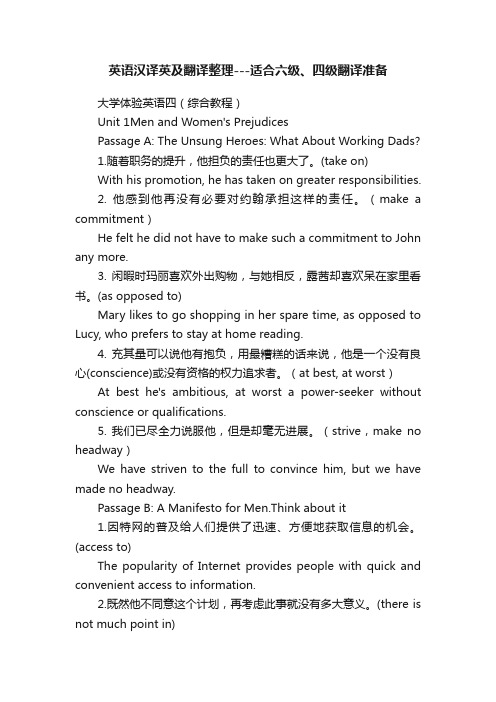
英语汉译英及翻译整理---适合六级、四级翻译准备大学体验英语四(综合教程)Unit 1Men and Women's PrejudicesPassage A: The Unsung Heroes: What About Working Dads?1.随着职务的提升,他担负的责任也更大了。
(take on)With his promotion, he has taken on greater responsibilities.2. 他感到他再没有必要对约翰承担这样的责任。
(make a commitment)He felt he did not have to make such a commitment to John any more.3. 闲暇时玛丽喜欢外出购物,与她相反,露茜却喜欢呆在家里看书。
(as opposed to)Mary likes to go shopping in her spare time, as opposed to Lucy, who prefers to stay at home reading.4. 充其量可以说他有抱负,用最糟糕的话来说,他是一个没有良心(conscience)或没有资格的权力追求者。
(at best, at worst)At best he's ambitious, at worst a power-seeker without conscience or qualifications.5. 我们已尽全力说服他,但是却毫无进展。
(strive,make no headway)We have striven to the full to convince him, but we have made no headway.Passage B: A Manifesto for Men.Think about it1.因特网的普及给人们提供了迅速、方便地获取信息的机会。
汉英翻译句子翻译PPT课件

14
LOGO
Examples:
长相思 (白居易) 汴水流,泗水流,流到瓜州古渡头。吴山点点愁。 思悠悠,恨悠悠,恨到归时方始休。月明人倚楼。
trans. Everlasting Longing See the Bian River flow, And the Si River flow! By Ancient Ferry, mingling waves, they go, The Southern Hills reflect my woe. My thought stretches endlessly, My grief wretches endlessly, So thus my husband comes to me, Alone on moon----lit balcony. (语音)
Imperatives are sentences which usually have no overt grammatical subject, and whose verb has the base form. They are used to instruct sb. to do sth.
Exclamatives are sentences which have an initial phrase introduced by what or how, usually with subject-verb order. They are used for expressing the extent to which the speaker is impressed by something.
例子:王明是男孩,张薇是女孩,他们都在四班。 (Wang Ming is a boy and Zhang Wei is a girl . Both of them are in Class Four. )
第四课句子解释总结
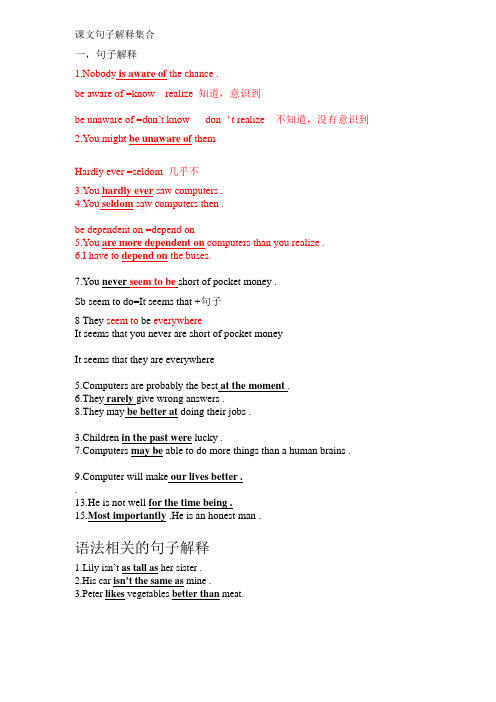
课文句子解释集合一,句子解释1.Nobody is aware of the chance .be aware of =know realize 知道,意识到be unaware of =don’t know don‘t realize 不知道,没有意识到2.You might be unaware of themHardly ever =seldom 几乎不3.You hardly ever saw computers .4.You seldom saw computers then .be dependent on =depend on5.You are more dependent on computers than you realize .6.I have to depend on the buses.7.You never seem to be short of pocket money .Sb seem to do=It seems that +句子8 They seem to be everywhereIt seems that you never are short of pocket moneyIt seems that they are everywhereputers are probably the best at the moment .6.They rarely give wrong answers .8.They may be better at doing their jobs .3.Children in the past were lucky .puters may be able to do more things than a human brains . puter will make our lives better ..13.He is not well for the time being .15.Most importantly .He is an honest man .语法相关的句子解释1.Lily isn’t as tall as her sister .2.His car isn’t the same as mine .3.Peter likes vegetables better than meat.。
09英汉翻译 -4专题汉英翻译步骤精简版-1分句合句分清主次

重庆市璧山县民营经济在发展过程中取得优异成绩
从这里出门散步去上山或是下山在一个晴好的五月的夜晚正象是去赴一个美的宴会比如去一个果子园那边每株数上都是满挂着诗情最透逸的果实假如你单是站着看还是不满意时只要你伸手就可以采取可以恣尝鲜味足够你心灵的迷醉
My mother coulle, and I couldn’t
小时候,我和妈妈互不相容,如果可以选择,我们谁也不
会愿意与对方成为一家人。
在我心目中,妈妈应该是中年摸样,褐色的头发盘起来,
挽成一个发髻,围着围裙,常在厨房打转,表情严肃,但 说话温柔,会唱圣歌,婚前应该是个中学老师或者图书管 理员。
但实际上,我的妈妈为了帮补家庭,很早就辍学工作了。
生我的时候,她才19岁,一个高个儿的假小子,一头蓬松 的金发,宽肩膀,窄臀部,腿修长,像个运动员,她也的 确是名运动员。在最艰难的日子里,妈妈也总能找到点乐 子,经常像放鞭炮一样突然大笑起来。一位腿脚不方便的 邻居跟我说,“我喜欢听到你妈妈大笑。”这邻居离我家 有两栋房子远。其他孩子的母亲唤孩子回家时,扯着嗓门 儿,声音尖而细,颤颤巍巍,我的妈妈则将两个手指放在 唇间,吹出来的口哨隔条街都能听到。(余译)
英汉大词典
中文辞书中当之无愧的权威和佼佼者,美誉无数,由复旦
大学陆谷孙教授主编,初版于1993年,最近新出了第二版 , 是我国首部独立研编的综合性英汉词典,兼具百科全书 的性质。这部“中国制造”的词典1991年出版后即成为联 合国编译人员使用的主要英汉工具书,被誉为“世界范围 内最好的双语词典之一”。“共收录词条二十二万,示范 典型,举一反三,译文通达,承载大量语法、语用信息, 兼顾学习型词典特征和百科信息”。
英语的佳作( 主要指文学作品) 浩如烟海, 它们在中国的佳译也不少。推荐几本:
lecture 4 英汉互译教程
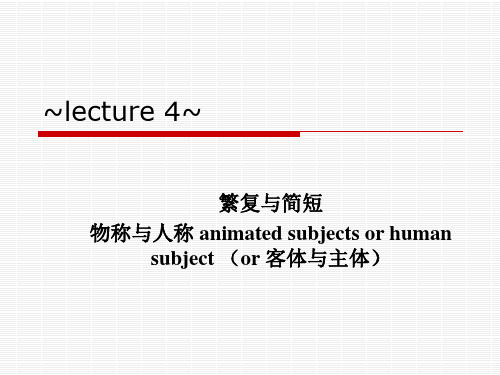
3). 他这时已是将近六旬的人,一表人才,高个儿, 眉清目秀,头发又多又黑,略带花白,恰好衬出他 那堂堂的仪表。 He was at this time in his late fifties, a tall, elegant man with good features and thick dark hair only sufficiently graying to add to the distinction of his appearance.
1). In the doorway lay at least twelve umbrellas of all sizes and colors.
门口放了一堆雨伞,少说也有十二把,五颜 六色,大小不一。 2)There are many wonderful stories to tell about the places I visited and the people I met.
英语注重形合,借助连接手段扩展和组合,形成纷繁复 杂的长句;汉语注重意合,结构流散,但语意层次分明。 英语长句的汉译常常要采用分解、拆散和重组的变通手 段进行灵活处理。 Many man-made substances are replacing certain natural materials because either the quantity of the natural product cannot meet our ever increasing requirement, or more often, because the physical properties of the synthetic, which is the common name for manmade materials, have been chosen and even emphasized, so that it would be of the greatest use in the fields in which it is to be applied.
英语翻译翻译第4课

• • • • • • • • • •
已所不欲,勿施他人 百家讲坛 豆蔻年华 多替对方着想 官腔 急功近利 垃圾文学 书痴 寓教于乐 知心姐姐
• Do not do unto others what you don’t want others to do unto you. • Masters’ telecourse • Sweet and near twenty • Practise you-ism • Bureaucratese • Litterature • Bookholic • Edutainment • Agony sister
• • • • •
(9) Come if you like. 高兴来就来。 (10) As it is late, let us go to bed. 不早啦,睡吧! (11) I framed the words in my mind: "Pardon me, but have I done something to offend you?" • 我心里在嘀咕:"对不起,我有什么举止行 为冒犯你了吗?"
• (7) There are some things that I have happily seen of the wondrous way of the spider. • 蜘蛛的奇异动态,我曾有幸目睹。 • (译文省去 "there are some things that"后, 文字简约,表达生动,意思明确。) • (8) In actual fact, the United States is pursuing a policy of encouraging the aggressor… • 实际上,美国在推行一种鼓励侵略者的政 策……
翻译技巧讲座:第四讲
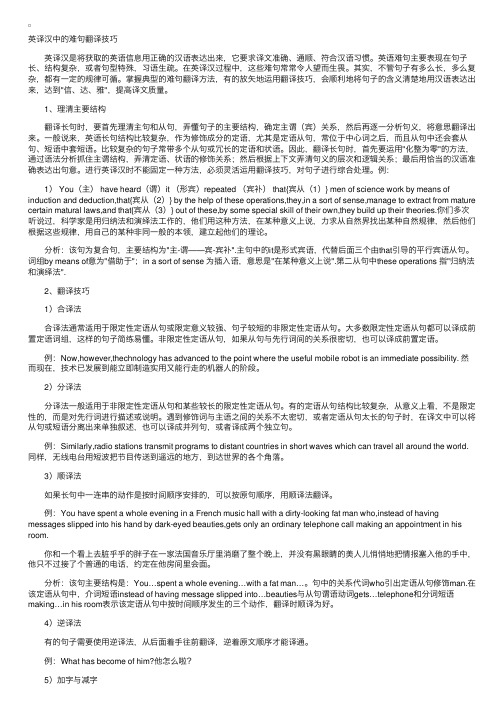
英译汉中的难句翻译技巧 英译汉是将获取的英语信息⽤正确的汉语表达出来,它要求译⽂准确、通顺、符合汉语习惯。
英语难句主要表现在句⼦长、结构复杂,或者句型特殊,习语⽣疏。
在英译汉过程中,这些难句常常令⼈望⽽⽣畏。
其实,不管句⼦有多么长,多么复杂,都有⼀定的规律可循。
掌握典型的难句翻译⽅法,有的放⽮地运⽤翻译技巧,会顺利地将句⼦的含义清楚地⽤汉语表达出来,达到"信、达、雅",提⾼译⽂质量。
1、理清主要结构 翻译长句时,要⾸先理清主句和从句,弄懂句⼦的主要结构,确定主谓(宾)关系,然后再逐⼀分析句义,将意思翻译出来。
⼀般说来,英语长句结构⽐较复杂,作为修饰成分的定语,尤其是定语从句,常位于中⼼词之后,⽽且从句中还会套从句、短语中套短语。
⽐较复杂的句⼦常带多个从句或冗长的定语和状语。
因此,翻译长句时,⾸先要运⽤"化整为零"的⽅法,通过语法分析抓住主谓结构,弄清定语、状语的修饰关系;然后根据上下⽂弄清句义的层次和逻辑关系;最后⽤恰当的汉语准确表达出句意。
进⾏英译汉时不能固定⼀种⽅法,必须灵活运⽤翻译技巧,对句⼦进⾏综合处理。
例: 1) You(主) have heard(谓)it (形宾)repeated (宾补) that{宾从(1)} men of science work by means of induction and deduction,that{宾从(2)} by the help of these operations,they,in a sort of sense,manage to extract from mature certain matural laws,and that{宾从(3)} out of these,by some special skill of their own,they build up their theories.你们多次听说过,科学家是⽤归纳法和演绎法⼯作的,他们⽤这种⽅法,在某种意义上说,⼒求从⾃然界找出某种⾃然规律,然后他们根据这些规律,⽤⾃⼰的某种⾮同⼀般的本领,建⽴起他们的理论。
(汉英翻译词类的转换
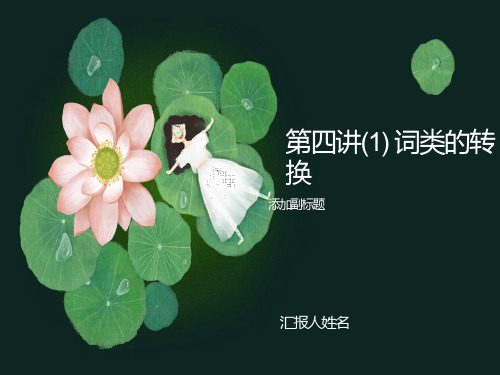
protective tariffs reciprocal tariffs petaliatory tariffs tariff-free zone industrial and commercial tax business tax sales tax value added tax
困难、棘手 那个小男孩把魔方摆弄了半天,摇摇头说:“真难!” Having tried a long time, the little boy shook his head at Rubik’s cube, saying, “this is too much”. 老局长听完案情报告,皱着眉头道:“这个很棘手” Having heard the report on the case, the head of the public security bureau frowned, saying, “there’s the rub.”
1
2
3
4
2.有效、效率高 1) 这种药治风湿性关节炎挺有效。 This medicine is effective against rheumatic arthritis. 2) 值勤的交警立即采取了有效的措施来疏导阻塞的车辆。 The traffic policemen on point duty took effective measures to relieve traffic jams. 3) 有效的管理是降低成本的重要因素。 Efficient management is one of the factors which will lower production cost.
练习 一、口译下列词语 1. 保护关税 2. 互惠关税 3. 报复性关税 4. 自由关税区 5. 工商税 6. 增殖税 7. 营业税 8 . 销售税
第四讲 汉英句子翻译1

第四讲汉英句子翻译(一)第一部分:基本策略一、主语的确定汉语中的一些句子处于句首的并非主语。
例如:1. 以前的功课也许有一大部分是为了这张毕业文凭,不得已而做的,(从今以后,你们可以依自己的心愿去自由研究了。
)You have perhaps finished your college courses mostly for obtaining the diploma, that is, out of sheer necessity. (However, from now on you are free to follow your personal bent in the choice of studies.)2. 这几天心里颇不宁静。
I have felt quite upset recently.当然也可以译成:The last few days have found me very restless.从以上的例子可以看出,要将汉语句子译成英语时如何鉴别、确定主语是一个极为重要的问题。
鉴于汉英语言之间的差别,确定主语时,应遵循以下原则:1. 必须符合英语的语言习惯和英美等国的文化习俗;2. 必须符合英美人的思维方式;3. 必须是句中应该突出的信息;4. 必须符合句中的逻辑关系。
也就是说,处于句首的即使是主语,翻译成英语也不一定是主语,这样的译文才较为地道。
例如:1. 我们的城市在过去的十年里经历了翻天覆地的变化。
The past decade saw great changes of our city.汉语从“城市”着眼,而英语则换个角度用“时间”做主语,这样译文更生动,更符合英语表达习惯。
2. 她从来没想到他是个不诚实的人。
It never occurred to her that he was a dishonest man.汉语原文中的主语是“她”,是行为的主体,这一句子结构反映了中国人的思维方式。
Chinese-English Translation[1]
![Chinese-English Translation[1]](https://img.taocdn.com/s3/m/9b89aff2910ef12d2af9e71d.png)
• The significance of Chinese Paintings • 中国画是可以现场表演的。画的题材大致 相同:牡丹,梅花,山水, 林中小屋等 。文人的画有不同的象征意义:竹子代表 正直,质朴;兰花代表谦虚和怀才不遇; 松树代表自强不息。
• 孔子对今天中国人的生活和思想依然有着 重大的影响。他是中国古代的思想家,教 育家,政治家, 也是儒学的创始人。
• 儒家思想是中国传统文化的主干。孔子的 哲学体系以“仁”为核心, 《论语》记 载着他的政治学说。儒学是一套伦理道德 ,强调的是为人处事的正派,人际关系的 和谐以及个人对国家的责任感。在孔子看 来,政治的廉洁是以人品的正直为基础的 。孔子还是个了不起的教育家,他平等对 待学生,教给他们民主,开放的观念。
• 译成祈使句
• • • •
1. 好好学习, 天天向上。 Study hard and make progress every day. 2. 学习好,工作好,身体好。 Study hard, work well, keep fit.
• 用it作主语
• 1, 真没想到他是个不诚实的人。 • It has never occurred to me that he is a dishonest man.
• 2, 从武汉到上海有一千多里路。 • It is one thousand li from Wuhan to Shanghai.
存现句的翻译
• 存在句
• 桌子上有一本书。 • 树上,地上,屋顶上都是雪。
• 存在句中的动词可以有许多。
• 存在句的翻译
• 1 在中国的东北有一个城市叫长春。 • 2 巷子里有一个古庙。
• 译成被动句
• 1. 大多数中学里都教英语。 • English is being taught in most middle s 城市。 • It is hoped that Shanghai will establish friendl relations with more foreign cities in the future.
汉译英翻译技巧讲解二(句子的翻译1)讲课稿
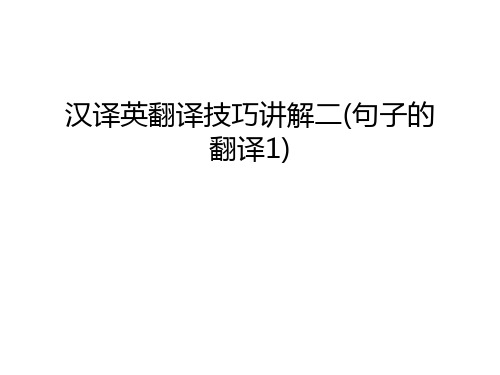
练习
1. 这个问题早就解决了。 2. 在明清期间,茶馆遍布全国。 3. 在古代,人们用中国结来记录事
件,但现在主要用于装饰。 4. 在这次表演中,所有的孩子都盛
装打扮,轮流唱歌跳舞。
练习
1. 这个问题早就解决了。
This problem has long been solved.
注解:“早就……”翻译时常用现在完成时; 句子中虽然没有表示被动的标记词,但“问题” 作为句子的主语,明显是动作的受动者,因此 用被动语态译出。
答案
2. 在明清期间,茶馆遍布全国。
During the Ming and Qing dynasties, teahouses spread all over china.
注解:“在明清期间”提示翻译时应用一般过 去时 。
练习
4. 在古代,人们用中国结来记录事件, 但现在主要用于装饰。
In ancient times, the Chinese knot was used to record events while now it is mainly used for decoration.
再例如:
好的厨师总是努力在谷物、肉类和 蔬菜之间取得平衡。
A good chef is always trying to strike a balance among grain, meat and vegetable.
注解:动词“取得”是“努力”的目的, 因此我们可以把“努力”处理成谓语, 而“取得”处理成目的状语。
The problem is being discussed.
3)当中文句子的主语过于宽泛,如 “人们”、“别人”、“这”等, 可将原文的宾语(承受者)转换成 主语,用被动语态译出,原来的主 语可省略 。
英汉翻译教程讲解第四章
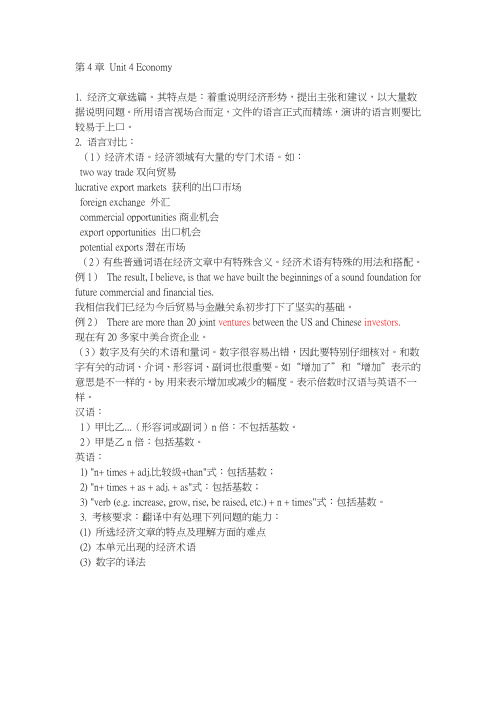
第4章Unit 4 Economy1. 经济文章选篇。
其特点是:着重说明经济形势,提出主张和建议,以大量数据说明问题。
所用语言视场合而定,文件的语言正式而精练,演讲的语言则要比较易于上口。
2. 语言对比:(1)经济术语。
经济领域有大量的专门术语。
如:two way trade双向贸易l ucrative export markets 获利的出口市场foreign exchange 外汇commercial opportunities商业机会export opportunities 出口机会potential exports潜在市场(2)有些普通词语在经济文章中有特殊含义。
经济术语有特殊的用法和搭配。
例1)The result, I believe, is that we have built the beginnings of a sound foundation for future commercial and financial ties.我相信我们已经为今后贸易与金融关系初步打下了坚实的基础。
例2)There are more than 20 joint ventures between the US and Chinese investors.现在有20多家中美合资企业。
(3)数字及有关的术语和量词。
数字很容易出错,因此要特别仔细核对。
和数字有关的动词、介词、形容词、副词也很重要。
如“增加了”和“增加”表示的意思是不一样的。
by用来表示增加或减少的幅度。
表示倍数时汉语与英语不一样。
汉语:1)甲比乙...(形容词或副词)n倍:不包括基数。
2)甲是乙n倍:包括基数。
英语:1) "n+ times + adj.比较级+than"式:包括基数;2) "n+ times + as + adj. + as"式:包括基数;3) "verb (e.g. increase, grow, rise, be raised, etc.) + n + times"式:包括基数。
第四讲汉英词义对比及C-E词的翻译

feed cows and milk them,
You simply couldn’t tell what’s good or bad for you.
所以,翻译实践中切不可一律以kill译“杀”,否则会闹笑话。
feed bulls for milk(喂公牛挤奶)。
2.词汇翻译中常见的难题
“words do not have meanings; people have meanings from words.”
一.英汉语义对比及词的翻译
1.语义对应现象 汉语和英语虽属不同语系却都拥有丰富的词汇量。 汉字的表意能力及组合能力很强,英语从拉丁语、古法语
及其他语言中吸收了大量的词汇,它们都是词汇量非常丰 富的语言,有着大量的对应词语。这是汉英翻译的语言基 础。
1.1. full equivalents:
Chinese Chaofan
家庭影院( 原指场所,现指设备) IHteisisuanlwwiasyesohf ahnekretroinbgeajfetearlopuesrosof noathl efarsmaenadntdogsapienas.k evil of others.
Water- gate, 粗细 thickness;
他们在会上闹起了意见。 They got into disputes at the meeting.
原东文西“ dir拉ec琴对ti”on中比; 的“表琴”明,汉语“杀”要比英语kill语义范围窄,一般只能 t这o篇st文ar章t 纯a用粹ma是于c在hin颠人e倒黑和白 动物,不能用于植物或无生命的东西;当然也有 “杀风景”、“杀威风”、“杀价”等用法,但不及kill宽泛; Since someone has to go anyway, let me go.
英汉翻译学习Lesson4
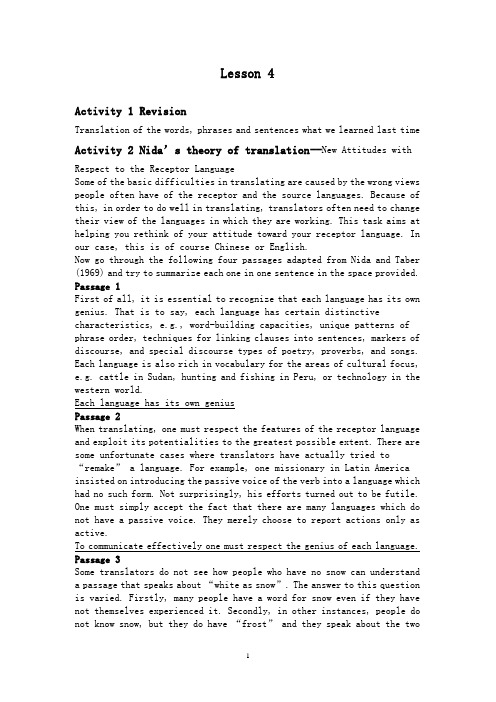
Lesson 4Activity 1 RevisionTranslation of the words, phrases and sentences what we learned last time Activity 2 Nida’s theory of translation--New Attitudes withRespect to the Receptor LanguageSome of the basic difficulties in translating are caused by the wrong views people often have of the receptor and the source languages. Because of this, in order to do well in translating, translators often need to change their view of the languages in which they are working. This task aims at helping you rethink of your attitude toward your receptor language. In our case, this is of course Chinese or English.Now go through the following four passages adapted from Nida and Taber (1969) and try to summarize each one in one sentence in the space provided. Passage 1First of all, it is essential to recognize that each language has its own genius. That is to say, each language has certain distinctive characteristics, e.g., word-building capacities, unique patterns of phrase order, techniques for linking clauses into sentences, markers of discourse, and special discourse types of poetry, proverbs, and songs. Each language is also rich in vocabulary for the areas of cultural focus, e.g. cattle in Sudan, hunting and fishing in Peru, or technology in the western world.Each language has its own geniusPassage 2When translating, one must respect the features of the receptor language and exploit its potentialities to the greatest possible extent. There are some unfortunate cases where translators have actually tried to “remake” a language. For example, one missionary in Latin America insisted on introducing the passive voice of the verb into a language which had no such form. Not surprisingly, his efforts turned out to be futile. One must simply accept the fact that there are many languages which do not have a passive voice. They merely choose to report actions only as active.To communicate effectively one must respect the genius of each language. Passage 3Some translators do not see how people who have no snow can understand a passage that speaks about “white as snow”. The answer to this question is varied. Firstly, many people have a word for snow even if they have not themselves experienced it. Secondly, in other instances, people do not know snow, but they do have “frost” and they speak about the twowith the same term. Thirdly, many languages have other equivalent idioms, e.g., “white as egret(白鹭) feathers”, or “white as fungus (菌类, 蘑菇)” (if there is an especially white form of fungus). The point is that snow as an object is not crucial to the original message. Of course if the form in which a message is expressed is an essential element of the message itself, then there is a limitation in communicating the message from one language to another.Anything that can be said in one language can be said in another, unless the form is an essential element of the message.Passage 4Since all languages differ in form, quite naturally the forms must be changed if one is to preserve the content. The extent to which the forms must be changed in order to preserve the meaning depends on the linguistic and cultural distance between the source and receptor languages. The easiest transitions occur when one translates from a language such as English into German for the two are quite similar to each other both linguistically and culturally. On the other hand, if one is translating from English into Hungarian, the formal shifts will be greater, for Hungarian belongs to a different language family than English. However, Hungarian is still part of the same cultural setting as English. Hence, the shifts are not so extreme. If however, one has to translate from English into Zulu, which belongs t the so-called Bantu family of languages and represents quite a different culture, the formal modifications must be more extreme.To preserve the content of the message the form must be changed. Naturally, a new attitude towards the receptor language implies a new view of the source language as well. We don’t have to go into the great details in this respect, for there are a lot of similarities between the attitude concerning the receptor language and that concerning the source language. It suffices (vi.足够, 有能力vt.使满足) our purpose to bear in mind the following three implications with respect to the source language. (1) The source language is subject to the same limitations as any other natural language; (2) the writers of the source language expect to be understood; and (3) the translator must attempt to reproduce the meaning of a passage as understood by the writer.Activity 3 Languages Differ: Differences in Clause OrderWe have done some serious thinking about the nature of translating. Well, to be a good translator, only serious thinking is not enough. We should also practice as hard as we can and as much as we can. In this activity, we shift our attention to examining the differences in clause order between English and Chinese and the impact this has on our translating. In Chinese, we say就要毕业的学生们仍在教室里学习 while in English the same meaning is presented as Those students who were to graduate very soonwere still studying in the classroom. In the Chinese sentence, the attributive就要毕业的 is placed before 学生们 and the adverbial 在教室里 is placed before 学习, while in the English sentence, the attributive who were to graduate very soon is put after those students and the adverbial in the classroom is put after studying.Task 1 Where to Put the AttributiveQuestions:1.In Chinese, where is an attributive put?2.In English, where is an attributive put?3.Is there a difference between the word attributive and phraseattributive concerning their positions in a sentence?(Both in English and Chinese)In English, when a word is used as an attributive to modify a noun, it is usually placed before the noun, though on some rare occasions it can also be placed after noun. In Chinese an attributive is almost always put before the noun it modifies.Now translate the following phrases into Chinese, paying special attention to the positions of the attributives.1.a well-managed company 一家管理完善的公司2.the architect’s luxurious house 建筑师的豪华住宅3.the ancient Chinese philosophers 中国古代的哲学家们4.something urgent 紧急的事情5.somewhere unknown 不为人所知的某个地方Of course, not only can single words serve as attributives, but short phrases as well. In English, when a short phrase is used as an attributive to modify a noun, it is usually placed after the noun, while in Chinese it is usually put before the noun.Now translate the following items into Chinese, again paying special attention to the positions of the attributives.1.a project of building up the first corpus of spoken Chinese in China (创立中国第一个汉语口语语料库的项目)2.a student with a lot of complaints for the university(一个对学校颇多抱怨的学生)3.particles moving round their atomic nucleus(环绕原子核运动的粒子)4.a machine able to recognize human voice(能识别人的声音的机器)5.a girl wearing a long white dress(穿着白色长裙的姑娘)6.a book easy to read(一本容易读的书)Read the textbook P23-24Conclusion: Usually in English, the word attributive is put before the noun, and the phrase attributive is put after the noun, but in Chinese, it is almost always for attributives to be put before the noun.Task 2 Where to Put the Adverbial1.In Chinese, where is an adverbial put?2.In English, where is an adverbial put?3.Is there a difference between the word adverbial which modifies an adjective and the word adverbial which modifies a verb concerning their positions in a sentence?(Both in English and Chinese)Now translate the following sentences into Chinese or English, paying special attention to the positions of the adverbials.1.She was not particularly beautiful, but she certainly left a deepimpression on everybody.(她并不是特别地美丽,但她显然给每个人都留下了深刻的印象。
10经贸翻译4-汉英对比
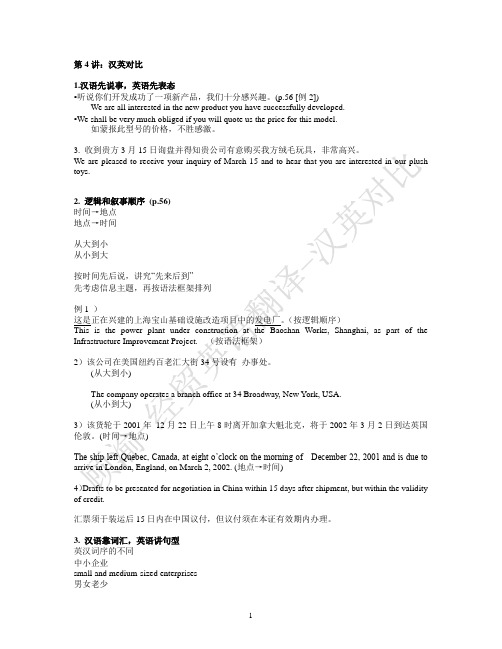
第4讲:汉英对比1.汉语先说事,英语先表态•听说你们开发成功了一项新产品,我们十分感兴趣。
(p.56 [例2])We are all interested in the new product you have successfully developed.•We shall be very much obliged if you will quote us the price for this model.如蒙报此型号的价格,不胜感激。
3. 收到贵方3月15日询盘并得知贵公司有意购买我方绒毛玩具,非常高兴。
We are pleased to receive your inquiry of March 15 and to hear that you are interested in our plush toys.2. 逻辑和叙事顺序(p.56)时间→地点地点→时间从大到小从小到大按时间先后说,讲究“先来后到”先考虑信息主题,再按语法框架排列例1 )这是正在兴建的上海宝山基础设施改造项目中的发电厂。
(按逻辑顺序)This is the power plant under construction at the Baoshan Works, Shanghai, as part of the Infrastructure Improvement Project. (按语法框架)2)该公司在美国纽约百老汇大街34号设有办事处。
(从大到小)The company operates a branch office at 34 Broadway, New York, USA.(从小到大)3)该货轮于2001年12月22日上午8时离开加拿大魁北克,将于2002年3月2日到达英国伦敦。
(时间→地点)The ship left Quebec, Canada, at eight o’clock on the morning of December 22, 2001 and is due to arrive in London, England, on March 2, 2002. (地点→时间)4)Drafts to be presented for negotiation in China within 15 days after shipment, but within the validity of credit.汇票须于装运后15日内在中国议付,但议付须在本证有效期内办理。
- 1、下载文档前请自行甄别文档内容的完整性,平台不提供额外的编辑、内容补充、找答案等附加服务。
- 2、"仅部分预览"的文档,不可在线预览部分如存在完整性等问题,可反馈申请退款(可完整预览的文档不适用该条件!)。
- 3、如文档侵犯您的权益,请联系客服反馈,我们会尽快为您处理(人工客服工作时间:9:00-18:30)。
第四讲汉英句子翻译(一)第一部分:基本策略一、主语的确定汉语中的一些句子处于句首的并非主语。
例如:1. 以前的功课也许有一大部分是为了这张毕业文凭,不得已而做的,(从今以后,你们可以依自己的心愿去自由研究了。
)You have perhaps finished your college courses mostly for obtaining the diploma, that is, out of sheer necessity. (However, from now on you are free to follow your personal bent in the choice of studies.)2. 这几天心里颇不宁静。
I have felt quite upset recently.当然也可以译成:The last few days have found me very restless.从以上的例子可以看出,要将汉语句子译成英语时如何鉴别、确定主语是一个极为重要的问题。
鉴于汉英语言之间的差别,确定主语时,应遵循以下原则:1. 必须符合英语的语言习惯和英美等国的文化习俗;2. 必须符合英美人的思维方式;3. 必须是句中应该突出的信息;4. 必须符合句中的逻辑关系。
也就是说,处于句首的即使是主语,翻译成英语也不一定是主语,这样的译文才较为地道。
例如:1. 我们的城市在过去的十年里经历了翻天覆地的变化。
The past decade saw great changes of our city.汉语从“城市”着眼,而英语则换个角度用“时间”做主语,这样译文更生动,更符合英语表达习惯。
2. 她从来没想到他是个不诚实的人。
It never occurred to her that he was a dishonest man.汉语原文中的主语是“她”,是行为的主体,这一句子结构反映了中国人的思维方式。
在英语译文中,主语被译成“It”, 看似风马牛不相及,其实这是西方人的思维方式:这种念头从来没有闪过她的脑际。
这是西方人比较重视客观事实的例证之一。
同时,译文这样处理重点突出了“她”对“他为人不诚实”这一点而感到惊奇。
3. 我给你打国际长途就跟给楼下的李姐打电话差不多,一拨就通。
An international phone call to you is as easy as a call to Sister Li downstairs.原文的主语是“我”,而译文的主语则是“an international phone call”。
因为“国际长途电话很方便”在原文中是非常重要的信息,译文中应该放在突出的位置,而且“an international phone call”作主语可以使后面的谓语更为洗炼、简洁,也更符合英美人的表达习惯。
4. 宗教不得干预政治。
It is impermissible to interfere with politics in the name of religion.宗教本身不会发出动作干预政治,是人们/团体以宗教的名义对政治进行干预。
因此,若译为:Religion must not interfere with politics .就不符合原句中的逻辑意义了。
5. 汉字在历史上有过不可磨灭的功绩。
* Chinese characters have made indelible contributions in history.The system of Chinese characters has played an invaluable role in the history.此例是汉语中常见的拟人法语言。
拟人法的现象在汉语中常见;在英语中,多数情况下,是视为修辞上的一种毛病(不符合逻辑事实)。
因此在汉英翻译中要注意这个区别,避免受汉语字面的影响而使译文有Chinglish的味道。
6. 我们恢复和采取这些贸易方式的原因很简单:因为我们出口商品就是为了我们国外客户消费方面的需要。
*The reason for us to restore and adopt these trade practices is very simple because our export commodities are for the use and consumption of our foreign customers.The reason why we have restored and adopted these trade practices is very simple .Our export commodities are for the use and consumption of our foreign customers.汉语“……的原因是因为……”,不能译成the reason is ……because……,不符合英语逻辑。
the reason why……是地道的英语。
所以,针对中英文逻辑上的不同,翻译时行文要及时变通。
7. 笆,用竹子、柳条等编成的一种东西。
Ba is something made of bamboo or willow branches.对中国人来说,该汉语句子根本不成问题,因为整体印象是对的;但是译成英语,除了要注意“等” 此处表示“列举后煞尾”,而不是“列举未完” 之外,还必须分析:“竹子”和“柳条”是并列关系,还是选择关系?换句话说,“笆”是用“竹子”和“柳条”一起编的,还是编一物时只选其一?由于只能是后者,英语就要用or;若用and 就不对了。
二、主语与谓语的习惯搭配有些动词,在汉语里只能用于人,而在英语里,既可用于人,也可用于物。
如:汉语的“目睹”,我们只能说人“目睹”,不能说物“目睹”;而英语的see ,witness ,或escape,既可以用于指人,也可以用于物。
例如:罗马遭遇了历史上的大事件:Rome witnessed great historic events.再如:1. 我没注意到这个错误。
The mistake escaped me (or my notice).2.这个运动首先在天津开始。
Tianjin first saw the rise of the movement.但有些动词,在汉语中既可用于人也可用于物,而在英语中则只能用于物,不能用于人。
遇到这种情况,在汉译英时,我们可以采取改变谓语动词或改变主语的方法。
例如:3. 蹲在池塘边苇丛中的青蛙叫得更起劲了。
*The frogs that sat among the reeds by the pond were shouting more enthusiastically than before.The frogs that crouched among the reeds by the pond were croaking more vigorously than before. “蹲”“叫”、在汉语中既可用于人也可用于动物,但是英语“sat, shouting” 与主语frogs 搭配不当;动词crouch (lower the body by bending the knees),croak (frog makes the deep low noise),用于指动物的行为。
4. 上海港不断更新设备,这个港口的生产已经面目一新。
*Now the production at this port has taken on a new look, as the workers of Shanghai port has constantly replaced old equipment with new.The workers of Shanghai port have constantly replaced old equipment with new and expanded its handling capacity.港口的装卸工作并不能“produce things ”,只是“move them”。
此例说明,有时我们通过改变原文主语的方法来使译文的主语与谓语搭配。
5. 任何新生事物的成长都是要经过艰难曲折的。
New things always have to experience difficulties and setbacks as they grow.此句把原文主语的定语作为译文的主语。
6. 他眼明手快。
*His eyes are bright and his hands are quick .(不符合英文逻辑)He is quick of eye and deft of hand.7. 这篇文章浅显易懂。
*This article is obvious and easy. (不符合英文逻辑)This article is easy to read and understand.8. 我对他敬而远之。
*I stand afar from him.I stand aloof from him.英语afar(far off)表达空间上的距离;而aloof (distant in feeling) 指情感上的远离,语义更准确。
三、词的增减1. 词的增补如前所述,汉语属意合语言,英语属形合语言。
汉译英时须把汉语中无需用而英语中却不可少的词增补出来。
1)增补结构词:连词,介词,代词(尤其是物主代词),冠词等群众心齐了,一切事情都好办。
When the masses are of one heart, everything becomes easy.我们应当逐步消灭城乡差别。
We should gradually eliminate the differences between town and country.她用手蒙住脸,好像是为了保护眼睛。
She covered her face with her hands, as if to protect her eyes.2) 为了使译文意思明确,增补实义词等要提倡顾全大局。
We should advocate the spirit of taking the whole situation into consideration.结婚大办宴席,实在可以免去了。
The practice of giving lavish feasts at weddings can well be dispersed with.三个臭皮匠赛过诸葛亮。
Three cobblers with their wits combined are superior to Zhuge Liang the master mind.2.词的省略1)省略重复词:汉语结构词(虚词)用得少,但为了讲究句子的平衡、气势、韵调等,常常重复实词——名词、动词、形容词等;而英语恰恰相反:一般来说,结构词不能少,实词却很少重复。
